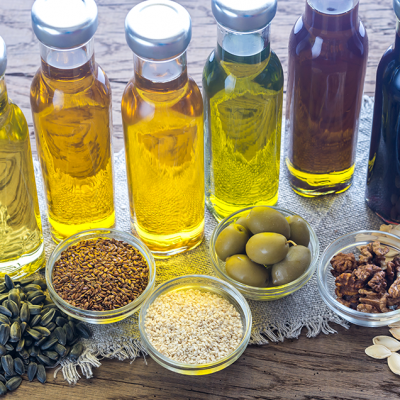Plant-based foods are good for you, so vegetable oils must be healthy since they come from plants right? Although technically not really from vegetables, processed seed oils like soybean oil, corn oil, canola oil, cottonseed oil, and a few others are commonly referred to as “vegetable oils.” It might come as a surprise that these “vegetable oils” aren’t all they are cracked up to be. In fact, they might even wreak disastrous havoc on your health.
Navigating the overcrowded supermarket oil shelf can be a rather daunting task, with each variety claiming to have a different impact on health or imparting various quality factors such as high-smoke point and a particular taste. So how do you know which oils actually do provide health benefits and are considered high quality? Which oils are the best choices for promoting your body’s innate cellular detoxification process known as autophagy? I’ve heard it said that low-quality vegetable oils might be worse for you than smoking a cigarette. What’s the truth in that? Let’s find out.
The Changing Face of Nutritional Benefits Of Oils
The low-fat craze of the 1990’s is about as passé as the shoulder pad fashion that same era gave us. While fats may be calorie-dense, they are necessary for the absorption of fat-soluble nutrients and they aid in satiety. Although current mainstream nutrition advice advocates that we consume less than 10% of our calories per day from saturated fat, the health benefits of consuming the right kind of fats are now receiving lots of attention.
Plants store their excess energy as triglycerides, which are extracted as oils from the seeds or pulp of a wide variety of plants. Each type of oil has a different mix of saturated, monounsaturated, and polyunsaturated fatty acids, a combination that can significantly impact their nutritional benefits. While many of us have been conditioned to think of dietary fat as our enemy, this is simply not the case. The truth is that fat is essential to optimal health — you just need to choose the right kind!
Saturated Fats
Polyunsaturated Fats
(PUFAs)
Monounsaturated Fats
(MUFAs)
Vegetable Oil Quality
Not all oils are created equal is an understatement. In addition to taste, factors like smoke point, vulnerability to oxidation, and whether they are refined or unrefined should all be considered.
Smoke point
Fatty Acid Oxidation
Refined vs. Unrefined
Although less stable, unrefined oils are minimally processed using the cold or expeller pressed methods which may help retain naturally occurring components that contribute to their health benefits. Terms under the unrefined umbrella include raw and virgin which indicate how many times the material was pressed to get the oil out. Extra virgin means that the oil is extracted from the first pressing only. Typically, unrefined oils taste like the material they were extracted from. Always choose the least refined option available to you when possible.
Choose organic when possible
Thumbs Up or Down?
Some Popular Oils and How to Use Them (or not!)
Although mainstream nutrition and health organizations suggest that unsaturated fats are much healthier than saturated fats, the composition of fatty acids in many so-called vegetable oils is different than any naturally occurring fats we’ve ever been exposed to throughout evolution. We’ve established that most “vegetable oils” contain high levels of omega-6 fats that may be harmful in excess. Many are also genetically modified, for example, canola oil is the result of a genetically modified rapeseed plant which was altered to produce seeds that were higher in the MUFA oleic acid. Oleic acid is one of the most abundant fatty acids found in foods and accounts for 12% of calories in the American diet. Regardless of having a high smoke point and more MUFA than PUFA, canola oil has a whole laundry list of problems on its own. It is anti-nutritive, denatured, highly refined, full of pesticides, full of chemical solvents, and oxidized/rancid.












